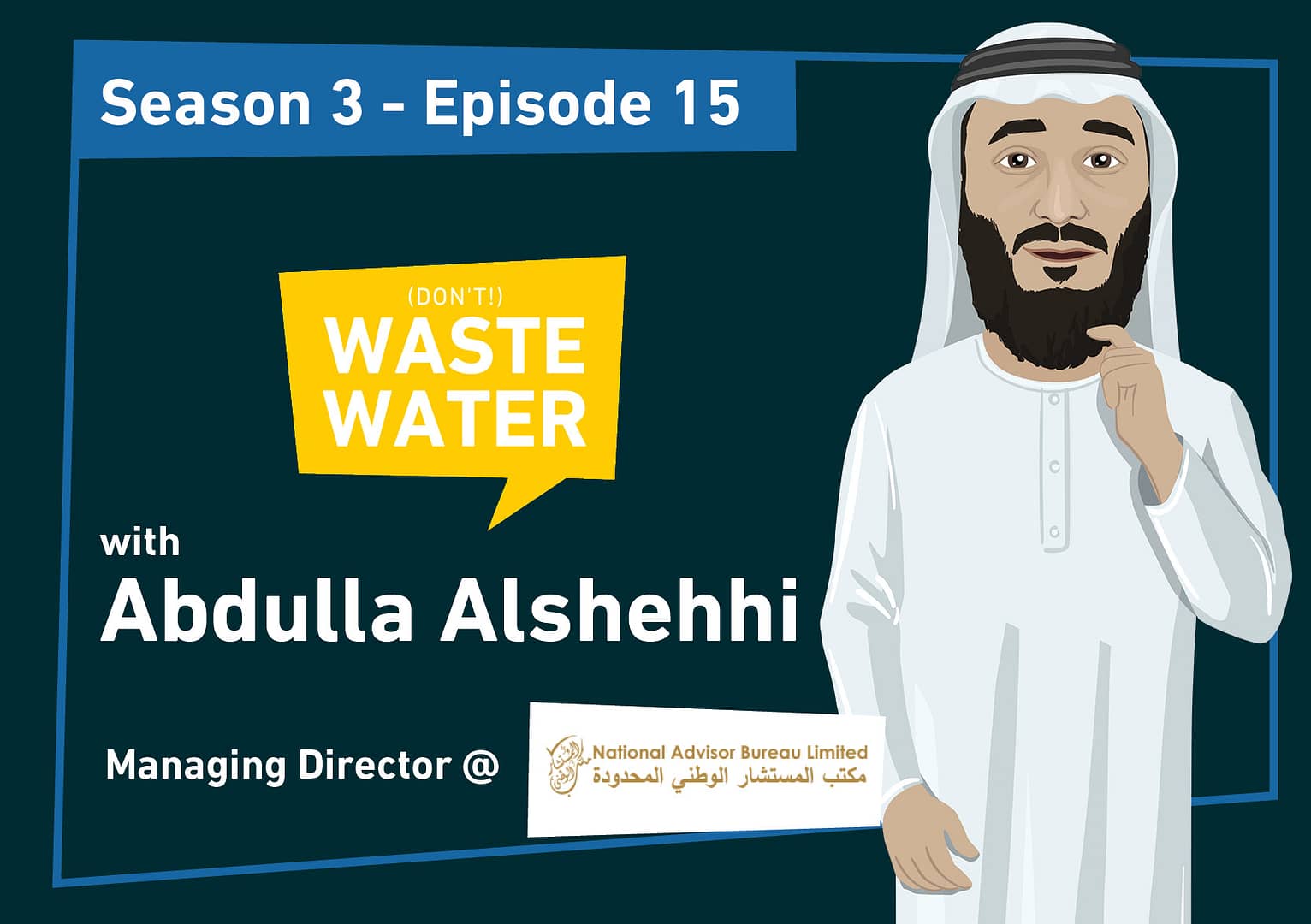with 🎙️ Abdulla Alshehhi, Managing Director of National Advisor Bureau Limited, CEO of Q2 General Cleaning, and Business Support Section Head at GASCO
💧 National Advisor Bureau Limited leverages creativity and innovation to be a leading Consultant Firm For start-up businesses & Established Companies
What we covered:
🌱 How to green a desert, you need a magical substance: Water!
🍏 How an Idea extensively investigated in the 1970s to bring and Iceberg in the Arab peninsula may now really become feasible
🍏 How Antarctic Icebergs may represent a sound source of water for the ever-increasing water needs of the World
🍎 How Water Scarcity is an intricate problem, and how it is not going to ease down with Global Warming
🛗 How Abdulla’s project interacts and leverages the other initiatives around
🍏 How he ambitions to run the first Iceberg tow to a southern hemisphere city like Perth or Cape Town
🍏 How the first to actually tow an iceberg to a thirsty place of the world will make history.
🍎 How iceberg water may be a welcome replacement for desalinated water, which comes with a wealth of environmental side-effects
🍎 How the water industry reacted to the project
🍏 How much an actual Icerberg tow would cost, and how that translates in terms of cost per gallon/liter
🍏 How, ecologically speaking, an Iceberg tow is a drop in the ocean with limited if any environmental impact
🌧️ How the presence of the Iceberg along the Fujairah coast may create a positive microclimate
🍏 How the United Nations are considering the idea as an unconventional water resource
🔥 … and of course, we concluded with the 𝙧𝙖𝙥𝙞𝙙 𝙛𝙞𝙧𝙚 𝙦𝙪𝙚𝙨𝙩𝙞𝙤𝙣𝙨 🔥
Teaser: Green a Desert
Resources:
➡️ Send your warm regards to Abdulla on LinkedIn
🔗 Check National Bureau Advisor’s website
🔗 Visit The Iceberg Project’s website

is on Linkedin ➡️
Infographic: How to Green a Desert?
Abdulla-Alshehhi-Green-a-Desert-Iceberg-Harvesting-InfographicRelated Video: Icebergs to Green a Desert?
Table of contents
- What we covered:
- Teaser: Green a Desert
- Resources:
- Infographic: How to Green a Desert?
- Related Video: Icebergs to Green a Desert?
- Full Transcript:
- Introducing: Abdulla Alshehhi
- Introducing: the Iceberg Project (that may Green a Desert)
- An improved Iceberg Towing technology that may ultimately green the arab desert
- Antarctica is rich of fresh water resources (in the form of Icebergs)
- What is the status of the Emirate Iceberg Project (that may green a desert)?
- Another Iceberg Towing and Harvesting project: Cape Town
- Fighting Water Scarcity
- Costs of Iceberg Water vs Costs of Desalination
- Welcome side effects of an Iceberg in the Emirates: Rain that may Green a Desert
- Next milestones for the Emirates Iceberg Project
- Rapid fire questions:
- Conclusion: Towing an Iceberg to the Emirates, & Green a Desert
- Other Episodes:
Full Transcript:
These are computer-generated, so expect some typos 🙂
Antoine Walter: Hi, Abdullah, welcome to the show. I’m very happy to have you today. For many reasons, one of which being that you’re working on a project, which I find pretty fascinating and the other being that’s you’re a man full of creativity and ideas.
Introducing: Abdulla Alshehhi
You have an electrical engineering background if I recall. Right. So can you just guide us through your steps?
Abdulla Alshehhi: Yeah. Electrical and electronic engineer I’ve uh, graduated from the University of Huddersfield the United Kingdom back in 2001. Then I joined an oil company in Abu Dhabi called ADNOC, and then I establish several companies, one of which is a Q2.
And I am as well as the managing director for the national advisor bureau. A consultancy firm based in Abu Dhabi, which has specialized in water projects as well as creative projects.
Antoine Walter: When you say water projects, which kind of projects do you cover,
Abdulla Alshehhi: We cover both saving and new resources for what unconventional water resources, such as, the UAE Iceberg project is one of our projects currently.
Introducing: the Iceberg Project (that may Green a Desert)
Antoine Walter: What. So I think you cracked, a major spoiler that is going to be the heart of our discussion today. And actually, I have to be very honest with you. The first time I heard of an Iceberg project iceberg as a drinking water source, I was thinking, no, come on. That cannot be serious. And then the more I read about it, the more it sounded like crazy that no one ever did it yet because it’s.
Such an incredible opportunity. And I was wondering, when is the first time you encountered this idea of bringing in an iceberg as a source of drinking water?
Abdulla Alshehhi: Back in 2013, I’ve started writing a book called filling the empty quarter. The books details several projects related to water, harvesting and water saving.
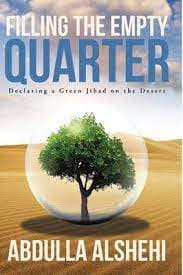
And the mission for that book is to. Make the empty quarter desert, which is the second-largest desert on the world. Make it again, green. And to make it green, we need the magic, what they call substance, which is water. So I was researching different projects and it struck me the iceberg project.
A first Iceberg Project in Saudia Arabia in the 1970s
So I learned that back in 1975, a french scientists called George Mougin have proposed the idea of throwing an ice bear to Saudi Arabia, to his, uh, Highness Mohammed Al Faycal of Saudi Arabia for the iceberg to be a water resource for the kingdom. And they established a company called the international iceberg harvesting with a $100 million capital.But unfortunately, due to technical issues, they stopped the project. I think 1977, I thought the project with now 2000, what we are in 21, the technical difficulties, which was faced by the project team back in 1970s is no more valid. So that’s why I started researching and studying the project in depth in order to make it for the United Arab Emirates
Antoine Walter: What were the technical difficulties they had in, in 1976?
Abdulla Alshehhi: Well, the Saudis faced two problems. One of the issues is the availability of towing tugboats enough at that year to tow the iceberg. But currently, we have hundreds of very strong tug boats, which can help us on the operation. The second issue is the depth of the iceberg.

The iceberg on average can go up to 150 meter on the, in depth. So they were not able to bring it to the red sea due to the shallowness of the water over there. And Saudi Arabia does not have a coast on the Arabian sea while we are in the United Arab Emirates. We have, so we can do it. So this is two of the main difficulties.
I visited George Mougin in 2017 to learn from him about the project and they have made a very strong study about it. And then they made the computer simulation in order to identify the best ways of technically making the project fees.
Modern solutions that change the approach of the Iceberg Towing Project (that may green a desert)
Antoine Walter: That is the project he made with Dassault Systemes right in the beginning of the 2000s, correct?
Abdulla Alshehhi: Yeah. He worked with Dassault Systemes in order to simulate the best way of making this project possible.
Antoine Walter: So you met him in 2017 and you wanted to pursue on somehow his dream. He was dreaming for that for 40 years. And you build on this modeling he was making with Dassault Systemes and also the project of the seventies.

And you said, okay, I can take the better out of these two worlds and make my own project in the Emirates?
Abdulla Alshehhi: Correct. Actually, after our meeting, while I’ve studied the project in different angles of a Beighton technology, which I think will help and make the project more, uh, introducing, first of all, the melting rate of the iceberg while in transit and to make an utter more feasible from a technical point of view.
An improved Iceberg Towing technology that may ultimately green the arab desert
Antoine Walter: So if I got it right, when I was reading some papers to prepare for a discussion, you have a unique way. To, to that iceberg of being patented, a device, which is especially addressing the way you told the iceberg. Can you tell us a bit about that? Maybe
Abdulla Alshehhi: I can’t give you all the details of the technical part of it because the patent is still under review by the time of the show.
But what I can tell you is that the technology which we are working on will reduce the melting rate and will help mitigate some of the risks related to the icepack operation that I utilizing green energy. While transporting the iceberg, utilizing the went for guiding the iceberg as well in order to reduce the fuel consumption during the transit of these aspects.
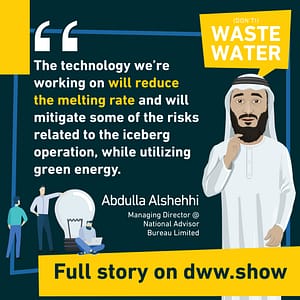
But let me highlight as well. Maybe we, Y we will say why we need water from ice barrier. The first place currently due to global warming, many icebergs disintegrate from antarctica. And once they disintegrate and they leave Antarctica, they float in the ocean and they melt wasting billions of gallons of the world’s most important substance, which is a fresh water.
The water in Antarctica and north pole as well is the world’s most, one of the world’s most freshest water. Unfortunately, currently is melting. Wasted on utilized. So the idea of making use of what nature or for us, I think will help us big time.
Antarctica is rich of fresh water resources (in the form of Icebergs)
Antoine Walter: What you’re saying here is that ice is melting anyways, because that’s a bit, what I was alluding to in the very beginning of that conversation was when it was singing.
You know, it’s only like, like strange to me to go and catch icebergs, but actually what I discovered. What you were writing and when singer interviews is that those icebergs are melting anyways, and they are out there. And if you don’t catch them, they’re actually wasted.
Abdulla Alshehhi: Exactly. Otherwise, I mean, a total waste, not billions, trillions of gallons of the world’s freshwater.
The global crisis related to water issue is increasing year by year due to population increase. So the water demands. All over the globe is in big and it is a very, a necessity to find the new resources. And the issue is due to global warming. We are having this problem. So what shall we leave the iceberg melts and utilize, or shall we try and make use of it in order to make the earth greener and fight the global warming one way or another?
If you see one.
Green a desert to fight global warming
Antoine Walter: On that topic of global warming and greening the earth in your book you mentioned several ideas of sources of water. And you said that iceberg is one of them. Is your intense today, steel to float an iceberg to the Emirates, to green the desert, or is it to bring the ice to produce drinking water?
Abdulla Alshehhi: The main purpose of bringing ice beds is for freshwater purpose. However, We manage and succeed to bring one iceberg. And we demonstrated that is doable. I think the water resource will be in abundance. We will have a blend of water to make the, not only the empty quarter desert, but all lands into Greenland’s.
We have plenty and show much water, which is currently wasted.
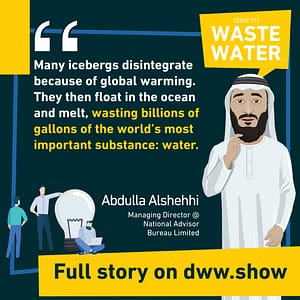
Antoine Walter: So you need to bring one, to make a proof of concept and that way, then you can have thousands of them. How many of these icebergs are produced by Antarctic? Every year?
Abdulla Alshehhi: I don’t have a exact number actually in the top of my mind, but I believe it is in the thousands.
Building on the work of the Iceberg Pioneers
Antoine Walter: You mentioned that you met Georges Mougin. Did you also have the chance to meet there that the prince and prince Mohammed bin Faycal al Saud?
Abdulla Alshehhi: Unfortunately he passed away.

Antoine Walter: And are you working with Georges Mougin or did he give you some advice? What’s your relationship to him?
Abdulla Alshehhi: I did learn a lot, not only from him, honestly.
And we were in discussion of having a joint working. They call it together, but unfortunately, we will have a different ways and different McKim. That’s why we did not go through it together.
What is the status of the Emirate Iceberg Project (that may green a desert)?
Antoine Walter: And regarding your Iceberg project. What is the current status?
Abdulla Alshehhi: Where currently, yeah, in the stage of launching a company related to water resources, which will handle the iceberg project financing purpose.
So we are on to investor looking for investors.
Antoine Walter: I read about your project, that you had some partners company, one being in Switzerland. And is that still valid or did you already have some partners? We did
Abdulla Alshehhi: sign a, several MOU with the major companies worldwide. I mean, we’ve signed with the califate university in Abu Dhabi for the research and development and do it with, through them.
We met with MIT team in order to see the technical part of it. And in term of companies, I would prefer not to disclose names currently because we have signed the MOU and a confidentiality agreement with them.
Technical Iceberg Towing issues are sorted – it’s time to run a proof of concept
Antoine Walter: So that means if I get your rights in the seventies, the project was around, but there were technical issues.
Those technical issues now are sorted. You even have a model mobilization that shows that the actual tooling is possible and you need to make a proof of concept in order to do that. Make it wider, but talking of the proof of concept, do you intend to take an iceberg and to bring directly to the rates?
Or do you want to make the first proof of concept where you would be going somewhere in the southern hemisphere?
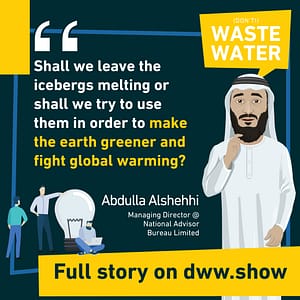
Abdulla Alshehhi: Our intention or the plan is to have the project in two phases. The first phase would be a pilot tan with a smaller ice bear, and we will be towing it to either. Perth and Australia, Western Australia, or to Cape town in South Africa, by that we will strengthen the technical part.
And we will ensure that all risks are mitigated. Of course, we will learn from it in order to start the second phase, which is to the United Arab Emirates, the journey from the place we were intended to harvest iceberg to Perth or South Africa may take three to four. Why is to the United Arab Emirates can take up to nine months.
The United that by ministry are intended to bring an bigger iceberg in order to supply more water
Another Iceberg Towing and Harvesting project: Cape Town
Antoine Walter: talking of Cape town. I’ve seen that there’s another project around in Cape town, which is led by Nick Sloan. Do you have links to that other iceberg towing products? Well,
Abdulla Alshehhi: I’ve met Mr. Sloan back, I think in 2018 as well. But we are separate entities.
Antoine Walter: The reason why I’m asking is that’s when I was reading all those papers and scientific research and documents. I mean, as I was already saying, it sounds quite surprising that no one ever just did it, just to try it out. And if we take that as an assumption that someone has to make a proof of concept, then somehow.
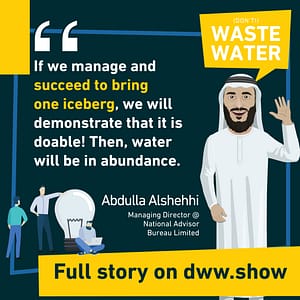
Whoever it is, if it’s you, or if it’s another team doing it, it can only help the full market to open up. Because if all of a sudden it becomes possible, then there’s no barrier anymore. And then you can start harvesting those waste its source of water. Do you see it that way or is it important to be the first team?
Becoming the first to tow an Iceberg
Abdulla Alshehhi: Well, it is important to supply water, to the ever-increasing demand all over the world. Whatever did it first for me personally is not an important issue. However, of course. Whoever did it, we’ll do it first. We’ll enter into history such a project, but uh, I see it from a humanitarian point of view and from an environmental point of view, we need to find a new water resource for humanity.
The population is increasing and the global warming is not helping us. So much problems around the world is due to global warming. We need to make the earth green again, in addition to the financial and commercial aspect of the project. But however, I have a personal environmental and humanitarian purpose of it.
Fighting Water Scarcity
Antoine Walter: Regarding the purpose. If you look at the projections, they say that in 2030, the world will lack roughly 40% of the water. We need to sustain our increased population, as you very rightly said. And part of that gap is expected to be field, especially in our replaces with destination and beat seawater, desalination, or brackish water, desalination, water reuse, an unconventional way to harvest water.
But if you look at the ecological balance. It sounds even more interesting to harvest an iceberg, which is not producing byproducts compared to the salination, which is producing prions, which are rejected to the sea. Does that also enter into your project and into your way of thinking?
Iceberg Water to reduce depedency to Desalination
Abdulla Alshehhi: Of course the currently the water resources, not only in the United Arab Emirates but throughout the Gulf is from desalination plants.
We are one of the biggest desalination. We have the biggest salination plants in the world. Because we do, we have an increasing population and we don’t have many water resources. Unfortunately, the desalination plants not only pollute the air, but they pollute the ocean as well by dumping hundreds of millions of brine water, which is brackish water.

Very salty, which is not helping the Marine in the Gulf. It’s not, I believe it’s not a long-term solution to the problem. We have water, which is worst wasted currently and melting on the ocean while we are capitalizing upon a technology, which is making the matter, even worse by making the global warming issue.
As a water professional, Iceberg Harvesting may sound from outer space
Antoine Walter: On the other hand, you know, desalination is an engineering topic. You know, if you’re an engineer, you see seawater desalination and you understand, there is a physical rationale. You don’t have so much to do with nature. So, you take salty water and you have a very much controlled process and you make drinking water out of it.
Whereas if you take an unconventional way, beads, iceberg harvesting, be it atmospheric water generation or whatever, you have much more nature involved, which is something you use. Much more difficulties to, to control. Obviously. Did you have contact with the water industry in general with the technical players around there?
And what was their reaction to your project after organized?
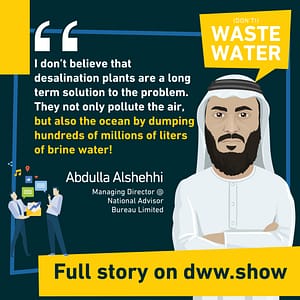
Abdulla Alshehhi: We’ve met with several parties and worldwide the players in the water industry when we presented them, the project where they were convinced about a possibility or the feasibility of the technical part of the project. So they see the demand of four is increasing worldwide year by year.
And we think we can really together a fighter role and to help in the population. Mitigate the water shortage issue.
… which does not help to close the financial roundtable (hence slows the project to green the desert)
Antoine Walter: And what about the financial side of your project? Did you make an estimate of how much it would cost to bring an iceberg to the Emirates? And if you take that cost and you make it a cost per cubic meter, do you have an idea of where you will land in terms of cost of the water?
You will.
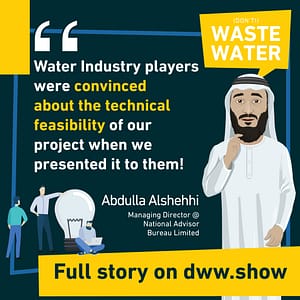
Abdulla Alshehhi: Our studies shows that the water per gallon is cheaper than the desalination plants water produced by desalination plants. And the estimated the project is value for the pilot, trying to either stay or South Africa may cost from 60 to $80 million while to the United Arab Emirates. We estimate it to them.
It may cost 120. Up to $200 million. Our study shows that the project is financially feasible. In addition to the technical part of
Costs of Iceberg Water vs Costs of Desalination
Antoine Walter: feasibility. When you say it’s cheaper than the salination, is it cheaper? How much cheaper would you say? Well, I would
Abdulla Alshehhi: not prefer to disclose numbers for that party.
Antoine Walter: But in terms of financial value, you say it’s cheaper
Abdulla Alshehhi: technical it’s it’s either because we have a valuable cost, which is the cost of a fuel for the tugboats.
This is a variable cost, which will play a big role into calculate in how much better gallon Badwater we supply to consumers. However, our study shows the water supply will be either cheaper or equal to the desalination plants to be specific
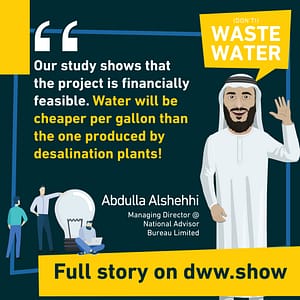
Antoine Walter: top of which you have the ecological impact, which is probably different.
I mean, better in the sense, there is no Brian’s, which are rejected to the sea, but now you have a massive ISE which is floating in tropical waters. Do you think that we’ll have an incident?
Abdulla Alshehhi: There will be an environmental assessment. A study was done and have concluded. There will be a minimal effect to the presence of this iceberg.
On the water. We are talking about a drop of water on the ocean. The Indian ocean is the world’s largest ocean, and these icebergs is a small, tiny peanuts to compare to the size. If you sure. So, the study shows a minimal effect to the ecosystem, as well as the environment
Welcome side effects of an Iceberg in the Emirates: Rain that may Green a Desert
Antoine Walter: in one of your interviews. I heard you explaining that there might be also positive ecological impact because if you have a massive cold air at that certain localized place, it might have an influence on clouds and metallurgical aspects.
I’m by no means a meteorologist. So I have no clue. Saying something that makes even remotely sense here, but did you have a look at that?
Abdulla Alshehhi: When we launched the project back in 2017 and we announced it in the news summary share shares have contacted us and they have highlighted something, which I believe is more crazy than the iceberg project itself.

They told us and the, the presence of this iceberg and they are called bodies at the warm water of the Arabian sea will create a micro climate. How these iceberg being a cold bodies, they will attract the floating clouds in the Arabian sea to its center. Causing a four techs mechanism until that making these clouds heavier until they were rain.
And they were rained continuously throughout the, as long as this, the region four, which is the iceberg, the cold body is present. I am a man, not a Metro geologist I have, but to have researched about it. And it seems to some extent, scientifically makes sense. This of course needs a fainter studies. That’s why we are on the discussion with the research center in order to confirm what we are saying.
The Iceberg as one of many solutions to Green a Desert
Antoine Walter: Well, it’s exactly the conclusion that I had myself, which was, it sounds to make sense, but probably it’s the kind of thing, which is a proof of concept. So I think we’re all this roots lead to the same thing, which is you have, at some point you to an iceberg up to the immune rates so that you have a basis point, then you can build up on that in your book.
The iceberg was one of 20 solutions plus than 20 solutions that you are you you drafted, is it the only one that you’re pursuing or do you have also other of these ideas that you intend to put into place?
Abdulla Alshehhi: We are a best shoeing, several ideas. However, the iceberg we are putting, we are investing. More time though, in the iceberg project, few Shami, because we believe the quantity of water, which can be harvested from iceberg is a huge, which can mitigate the other resources.
If you show me the benefits of having it can overweight any other solution we can propose currently in the market.
Next milestones for the Emirates Iceberg Project
Antoine Walter: Very clear and on the iceberg itself, what is going to be your next milestone?
Abdulla Alshehhi: Next milestone is to conclude the financial commercial part of it and establish the company with the help of our investors in order to start operation, hopefully by end of 2023 the pilot turn I’m saying.
So hopefully our plan is like that. Unfortunately last year we were due to. Organize a conference where we were planning to bring scientists and investors to the way, but unfortunately, to the, due to the Corona issue, we stopped and hopefully Corona issue will go away and we can start the conference again.
It’s important that we learn from all scientists and we hear from them and as well as investors in order to make this project hopefully feasible.
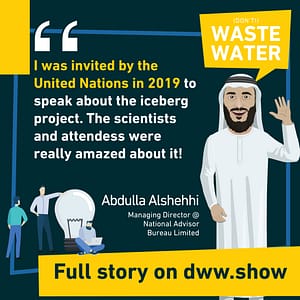
Antoine Walter: And aside from the financial topic, is there anything else which is preventing you from concluding the project?
Abdulla Alshehhi: Well, nothing much. And every financial part is the main issue which is not stopping us because you have signed.
And we have concluded with the, several interested, the investors and parties. So shall hopefully the ball will roll faster, hopefully by next year. Inch Allah!
A surprisingly promising project
Antoine Walter: if I can give you my very personal opinion here. I’m really surprised that you don’t get like 10 times the finance you need, just because, you know, when I’m looking at the projects which are out there and which are funded nowadays to solve the water crisis, I couldn’t find a comparable one in terms of size.
Because, you know, I’ve been covering for instance, atmospheric water generation on that microphone with an F current sing Baga from Asheville. And it’s an awesome solution, but it’s not going to bring the level of water, the scale of water you can bring with an iceberg and the iceberg project, maybe fully stupid.
I don’t want to offend you. It may be, I mean, no one ever did it, but the risk involved when you’re saying that’s bringing a nice broke, should human rates would call 120 to $200 million. It’s not that much compared to the $4 trillion we have to invest. If we wants to meet the sustainable development goal, number six and two.
For all. So it’s exactly like you said, in terms of ecological impact of the iceberg in the ocean, which is a drop in the ocean. I mean, financing a nice Brooke towing project seems from what I’ve read and by no means an expert, but from what I’ve read, it seems to be a drop in the ocean. And if it works, it’s a shift of paradigm almost.
I told you, it’s my very humble opinion!
Starting somewhere: Towing a first Iceberg to make history
Abdulla Alshehhi: I respect your opinion, my friend, I mean, of course you have to start somewhere. I mean, we’re talking about a serious issue here. Water shortages about life or this a humanity is not something nice to him. However, I mean, with our investors, they are convinced that they from technical point of view is that doable.
And it’s not that difficult to operate, but hopefully inshallah of course because it’s not, it has never been done. That’s why people with negative notes on it, but a hundred years ago, maybe no one was stepping on their, what they call it, the moon. But currently we have so many people going on the moon and working on it.
So this is much easier than going to the moon. I think the science is advanced big time to solve this issue. Very
Antoine Walter: simple. Yeah. So maybe we can suggest to Jeff Bezos the next time, instead of going to the atmosphere with a spacecraft, you can invest the same amount, the same ticket of money, and you can do an iceberg actually, or finance to have an iceberg.
Antarctica as a water reserve for humanity
Abdulla Alshehhi: My friend Antarctica is the water reserve for humanity. Currently 10,000 trillion ton of fresh water is available. There is a huge amount of food. And we’re not going to go and cut any piece we’re going to drag, which is over already disintegrated then will be wasted and melting. So I think the rationale behind it is logical and make sense.
I was invited by United nation, 2019 to speak about this, uh, the iceberg project as one of the unconventional water resource in Stockholm, from a technical point of view, the scientists and the people there were really amazed about it. So we believe it’s a, from a technical point of view is not any undoable.
Antoine Walter: So it seems like all the stars are aligned and it just needs a pioneer to be the first to move. I wish you to be the first one Abdula. It was very pleasant to have the deep dive with you on that very fascinating topic. I will be very happy to have you back on that microphone. As soon as you have hit your next milestone, or you can announce that you’ve closed your financing rounds.
So by any means, I would be very happy to follow up on that one for now. If that’s fine with you, I propose you to switch to the rapid for our questions to close our discussion.
Abdulla Alshehhi: Yes. Thank you my friend for having me today.
Rapid fire questions:
Antoine Walter: So for the last section of our discussion today, I’m going to ask you very short questions and you can have very short answers. And my first short question will be
What is the most exciting project you’ve been working on?
Abdulla Alshehhi: Wht more than the iceberg project! I’ve been at the four corners of the earth for this project, I’ve been to USA to South Korea, Japan to South Africa, UK France.
This is, I think I’ve invested a lot of time and money into it, and I believe it will be the Inch Allah.
What’s your favorite part of your current job?
Abdulla Alshehhi: Creativity and innovation, I believe for any problem, there are many solutions, but we need to think outside the box.
Antoine Walter: It’s interesting and sorry to sidetrack here, but it’s interesting because all the people that have seen working on the iceberg project, starting with John Isaacs in the fifties, or John Hult from RAND who wrote a big report on that, they all had this approach to say.
If we do things like we’ve always done, then we’ll get the same results that we always had. So these creativity aspects seems to be a common pattern among all the people which are we’re looking at the topic. Yeah, correct.
Abdulla Alshehhi: Most, I mean, we have to see from different angles. There are, there is no problem without a solution, but we need to think positively and solve our issues with the outside thinking.
What is the trend to watch out in the water industry?
Abdulla Alshehhi: Well, there are many technologies, as you said before, like the water from air is an interesting as well technology to watch for, but unfortunately the operating cost is a huge, as part of my study. I hope inshallah, they will make it cheaper for it to be.
What is the thing you care about the most when you’re working on a new project and what is the one you care the least?
Abdulla Alshehhi: I care about the people who work with me, my team, of course without them you cannot achieve much. And I don’t involve myself in, I can see normal projects. I try to get involved in creative, innovative, and new projects.
This makes me more satisfied the future.
Do you have sources to recommend, to keep up with the water and wastewater market trends?
Abdulla Alshehhi: Well Georges Mougin can be one. He’s an encyclopedia for water, iceberg, green a desert. I met them and they learn a lot from him.
Antoine Walter: Two clues. I’ll ask you the question that I usually ask at the very beginning of every interview, but I forgot because I was too excited to talk about Iceberg with you.
Can you send me a postcard from the police you add? What can you tell me about the place you at right.
Abdulla Alshehhi: I’m in Dubai, my friend, I’m in the Dubai, Dubai currently mashallah the life is coming back to normal step by step and hopefully well welcoming expert 20, 21 month to come now. And the entire world will be here.
So I’m excited for the days, inshallah October, when we will start expo 2020. And you are most welcome as well. My friend to come here.
Conclusion: Towing an Iceberg to the Emirates, & Green a Desert
Antoine Walter: Well, that would be with pleasure. Anyways. It has been an incredible pleasure to discuss with you today. And as I already said, I’d really like to follow up on your project.
I have to say quite exciting things.
Abdulla Alshehhi: Doula many signs, many. Thanks. My friend, inshallah. Hopefully we’ll keep posted together. Thanks for listening to don’t wastewater. This podcast was brought to you by GF piping systems. Loved this episode, head over to apple podcast, to subscribe rate, and leave a review.
See you next time.

